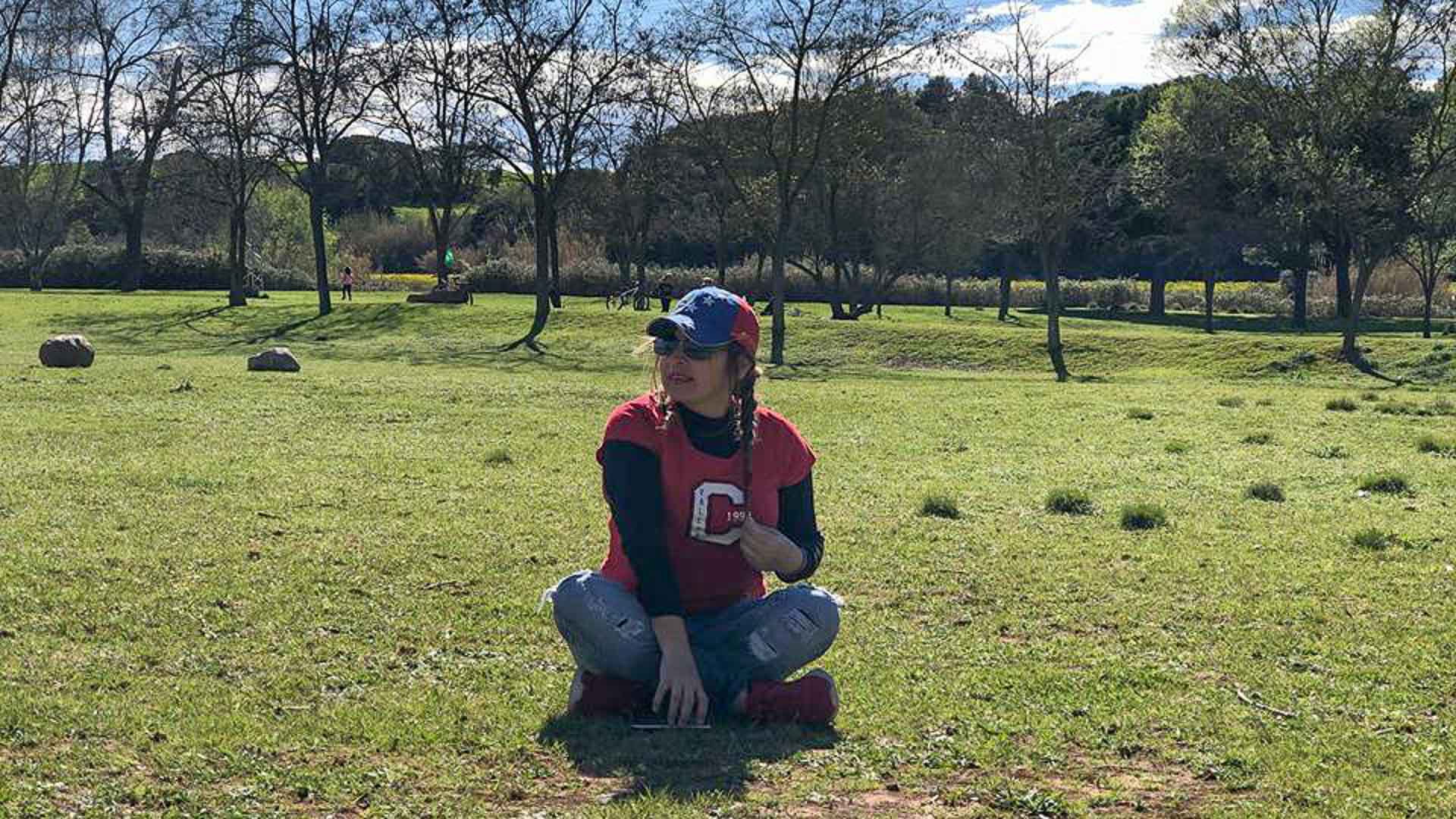

One day in June of 2015, María Beatriz Lara, a reporter with 20 years of experience in her field, attended a press conference at the office of the scientific police in the state of Aragua. She was assaulted and handcuffed for no reason by several police members there, who were later indicted and ordered to be arrested by a court. But four years later, the trial is still pending, the officials are free, and the journalist, sick and tired of waiting for justice to be served, decided to leave the country and change her life.

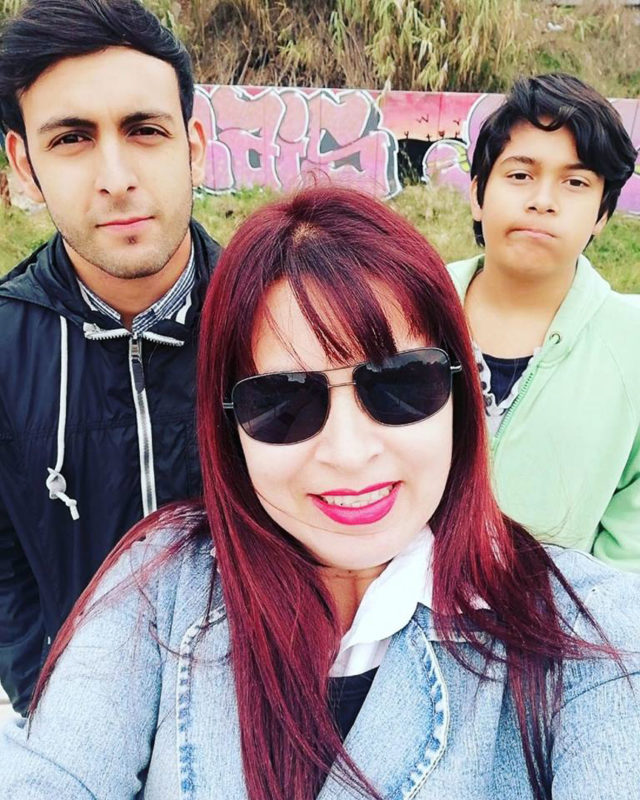 Photos: Family album
Photos: Family album
María Beatriz Lara sits for a few minutes on a bench in the Turonet Park, in Ripollet, a town in Catalonia. Her strenuous daily routine of cleaning apartments starts at 8:00 in the morning. After that break in the park, she goes to her second job at a clinic, which she leaves at midnight. She has cried many times in that park, remembering her family, her profession and the country she was forced to leave.
María Beatriz is a journalist. She was born in the state of Lara, but lived for more than 25 years in Maracay, Aragua, where she worked for a good 20 years and made a career as a reporter for the El Aragüeño newspaper, with a fruitful record that earned her several regional awards. But on February 7, 2017, everything she had accomplished seemed to fade away: she arrived in Spain with her two children, leaving her notebook, pen and tape recorder behind, feeling lucky to have found a way to make a living.
“This park has my every secret and pain,” she says.
And there is one that still throbs like an open wound. It was the reason why she took the decision to jump on a plane and cross the more than 4,900 miles that separate Spain from Venezuela.
It happened on Friday, June 19, 2015. The day had started just as an ordinary one. She went to cover a story with photojournalist Alfredo Paradas, just as other journalists had done: it was a press conference by Elvis Amoroso, a member of the ruling United Socialist Party of Venezuela, who was then the first vice president of the National Assembly.
The meeting point was the office of the Scientific, Criminal and Forensic Investigations Corps (CICPC, by its Spanish acronym) in Villa de Cura, in the municipality of Zamora, state of Aragua. The reporters were waiting when they noticed an unusual activity outside the police station. María Beatriz’s journalistic instinct compelled her to investigate what was happening and she decided to get in. Alfredo Paradas went with her and the others waited outside, expectant.
There was no sign reading that journalists were not allowed in the facilities. Never before had access to reporters been restricted in Zamora’s CICPC, so María Beatriz asked to speak with the head of the police precinct.
“I don’t give a shit who you want to talk to; get the hell out of here,” an inspector named Edgardo Villegas replied, inexplicably.
María Beatriz, taken by surprise, spoke out and demanded respect: she said she was a journalist.
“Why should I respect a whore and slut the likes of you! Get out of here!
“Show some respect, respect!” said Alfredo Paradas, who stood up, firm, wearing his press ID and vest.
But the man pushed him and knocked him down to the ground and then a dozen officials approached and began to kick him. Inspector Villegas ordered his arrest; they grabbed him by the arms and feet while they beat him.
“Help, help!” shouted María Beatriz.
But instead of help, what María Beatriz heard was the inspector say bluntly:
“Arrest that bitch.”
Since none of the officials obeyed his orders right away, he arrested her himself.
“I’m a journalist, I’m a journalist!” repeated María Beatriz.
But, truth be told, Villegas didn’t give a dam about the woman’s cries: he held her by the arm, pulled her by the hair and started banging her head against the wall as he said:
“Fucking journalists! Now you will have plenty to write about.”
Rosmery Lama, the only woman official that day at the CICPC office in Villa de Cura, did obey another of Villegas’s orders: she checked María Beatriz’s private parts, took her by the hair and pushed her into an office. She wouldn’t allow her to sit down. She tried to rip her shirt off and strip her naked, but she didn’t succeed.
“Take it off! And also take off your pants and underwear!”
She complied, but then another order came.
“Jump. I want to check if you carry drugs or a weapon stuffed in your vagina.”
The journalist jumped.
“Nothing to report,” said the official to her boss.
Villegas, however, asked the officer to handcuff her. The place was so overcrowded with detainees that they had to take the handcuffs off an inmate to put them on her. They forced María Beatriz to stand still, her hands behind her body, handcuffed to a beam. Her fellow photographer was also handcuffed to that beam.
“I won’t make it out of here alive,” she thought to herself, furious about what she was going through. And as she felt that her arms would explode any minute, she began to talk to God. The image of Saint Rita of Cascia, the Patroness of the Desperate and Impossible Causes, came to her mind, and she prayed.
She prayed a lot.
It took one hour and a half for the journalists who were still waiting for the PSUV lawmaker to realize that María Beatriz had been detained inside the CICPC. Alarmed, they posted the incident in their social network accounts and the news soon became “viral”.
Commissioner Luis Ollarves, who at the time performed as the director of the CICPC in Aragua, came forward and claimed through social networks that it all had been a “misunderstanding”. Congressman Elvis Amoroso had not arrived yet, but he sent his two chiefs of security to talk privately with Commissioner Argenis Suarce, an investigations supervisor in the Villa de Cura station. After that meeting, they took María Beatriz and Alfredo Paradas to his office.
“Inspector Edgardo Villegas is under stress from last night’s operation,” Suarce told them, as an explanation for Villegas’s aggressions.
Maria Beatriz began to cry.
“Calm down; forget what happened; it is better if this does not escalate any further.”
Shortly afterwards, the vice president of the National Assembly arrived at the police station.
“Calm down,” said Amoroso to María Beatriz when he saw her, patting her on one shoulder. We will send you the press release; go home and rest.”
That’s when they let them out.
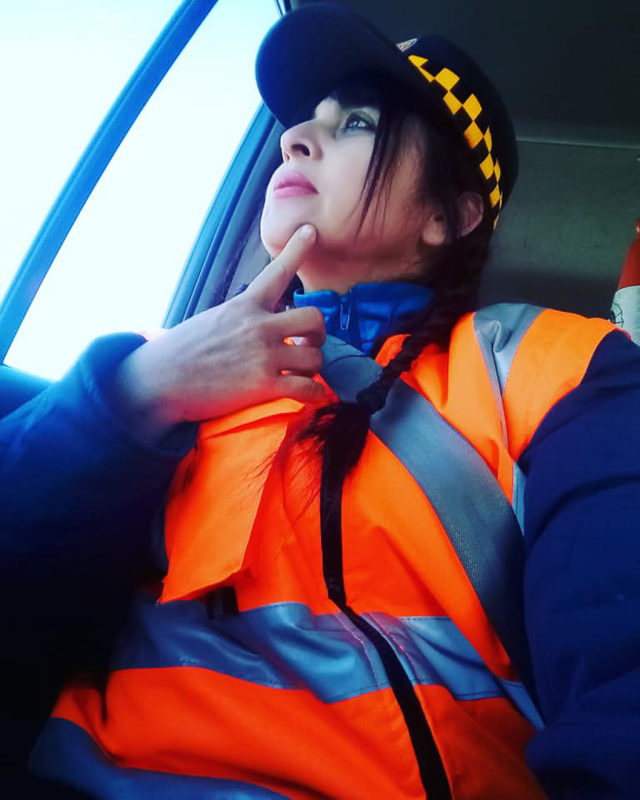
Some representatives of the regional government, having heard the news, phoned her to offer her their support, which she would never receive. On that same day, the regional executive’s press director, Marbelis Linares, called her on behalf of the then governor, Tareck El Aissami, promising her that justice would be done. And she herself accompanied María Beatriz and the photographer to the CICPC headquarters. Commissioner Luis Ollarves was not there. They were received by the chief of the motor-vehicle division, who suggested that they file a complaint with the Public Prosecutor’s Office.
María Beatriz got home feeling very scared. It was Friday. She locked herself at her house for the entire weekend with her two children. While she tended to her bruises, she wondered if it would be worthwhile to file a complaint. But colleagues and lawyers insisted that she should file it. Three days later, still skeptical, María Beatriz proceeded, despite the fact that she was well aware of the risk that she could run for demanding that her aggressors be penalized.
With the support of non-governmental organizations, such as the Press and Society Institute and the National Association of Journalists, as well as lawyers from the NGO Espacio Público [Public Space], María Beatriz Lara appeared at the Office of the Public Prosecutor for Fundamental Rights. Shaking and scared, she was greeted by Prosecutor Elías Martínez. He immediately ordered a forensic examination on her, which was performed after arrangements were made by the governor’s chief of press.
The prosecutor granted María Beatriz protection measures, appointed a special commission and ordered an investigation to be initiated by Acting Assistant Prosecutor Carla Camero.
Then, Alfredo Paradas decided not to go forward with the complaint, but the process had already been set in motion. During the collection-of-evidence stage, the police headquarters were inspected. In the computer of the new head of the CICPC precinct in Villa de Cura, the one who replaced Villegas, they came across a folder labeled “journalist’s case”, which contained a video where the aggression to the reporter and the photographer had been recorded.
The investigations went on for more than a year. In the meantime, Prosecutor Elías Martínez was replaced by Leiba Morín Ponceleón, a former CICPC officer who was performing as a prosecutor for the Fourteenth Public Prosecutor’s Office in the municipality of Zamora at the time of the events. In November of 2016, the Tenth Court of Preliminary Proceedings and Supervision in the State of Aragua, presided over by Judge Lorena Moreno, indicted the police officers: the charges against Edgardo Villegas were cruel, inhuman and degrading treatment, and those against Rosmery Lama were inhuman and degrading treatment. Both were ordered by the Public Prosecutor to be detained and brought to trial, with no substitute precautionary measures that could facilitate their escape.
However, the two inspectors had already been transferred to a different office outside the state of Aragua.
The first preliminary hearing was scheduled for January 1, 2017, but it was postponed to March because the defendants failed to appear. The journalist’s lawyers insisted on asking for a new date, which the court set for June 1, 2017, just a few days short of the two-year mark of the events. But the hearing never took place, nor would it on the other ten dates that the court subsequently scheduled it while María Beatriz was still in Venezuela.
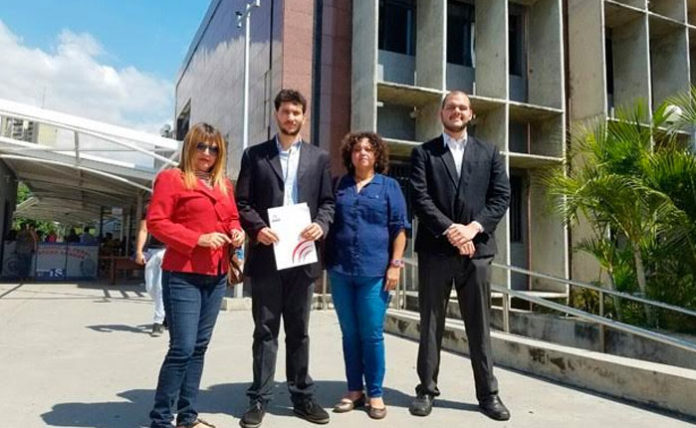
María Beatriz felt compelled to pull out her children out of their sports activities. She feared that they could be in danger. One day, her eldest son, while on his way to the university, spotted a white car with tinted windows and no license plate by the bus stop. Another day, a CICPC officer, one of the many that she had met while doing press coverage work in the region, warned her: “Careful with your son.” From then on, she and her 20-year-old boy would lie wide awake at night, looking out the window, the air conditioner turned off, watching out for the sightless noise. They lived on a permanent state of alert. María Beatriz felt that she had been confined to her house.
And she wasn’t happy either with the lack of support from the newspaper to which she dedicated 20 years of her life and where she made a career. On the day of the aggression, not even a note was published reporting on what had happened. After her workmates voiced their discontent, the newspaper assigned her a lawyer, whom María Beatriz would see just a couple of times.
It all led the journalist to believe that if she wanted some piece of mind, she needed to go far away.
And so she did on February 7, 2017.
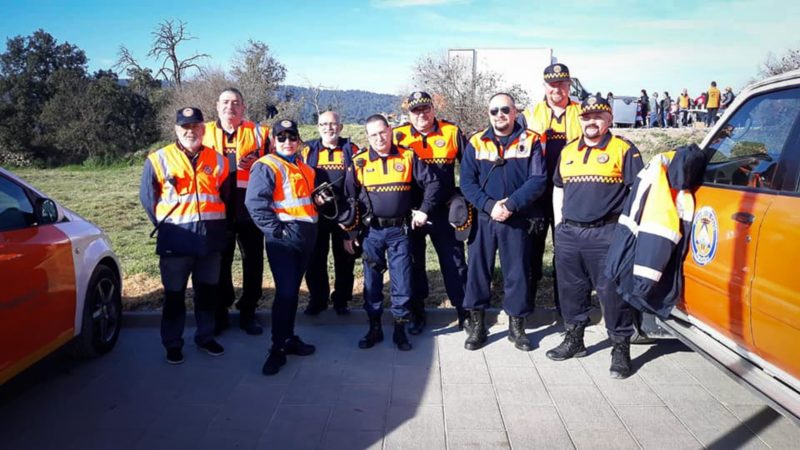
“In my country, practicing journalism is a crime. That’s why they “shelve” the complaints, so that the cases fade into oblivion and the victims wear down. But believe in divine justice; otherwise, I would have given up already,” notes María Beatriz from Les Fontetes, another name for the park in Cerdanyola del Vallés where she usually stops on her way home after 16 hours of work.
In June of 2019 it would be four years since the events occurred.
The judge was ordered to retire and another one was appointed in her place. The officers involved in the case are still in active duty in the CICPC. The first hearing has never taken place. María Beatriz already lost count of the deferrals. She recalls that the last date she heard about was February of 2018. By then, she and her two children had been living in Spain for one year.
While she cleans the floors of houses and offices, she thinks that changing her trade and country paid off. Her two children have learned Catalan in no time, which makes her proud. The eldest has taken a job while he prepares to continue his studies, and the youngest is already attending school.
She recently joined the Association of Civil Protection Volunteers in the Catalan town where she lives.
“Today, we get to walk free down the streets. And I sleep soundly at night, with no fear, with no stress or anxiety. My children are safe.”
Translation: Yazmine Livinalli

Note: This is a story of the Venezuelan website La vida de Nos. It is part of its project La vida de Nos Itinerante, which develops from storytelling workshops for journalists, human rights activists and photographers coming from 16 states of Venezuela.
2443 readings
I am a journalist, fortunately, because I cannot see myself exercising any other profession. I am a correspondent for Crónica Uno and for the Press and Society Institute in Aragua. I am also an active human rights defender.
Un Comentario sobre;